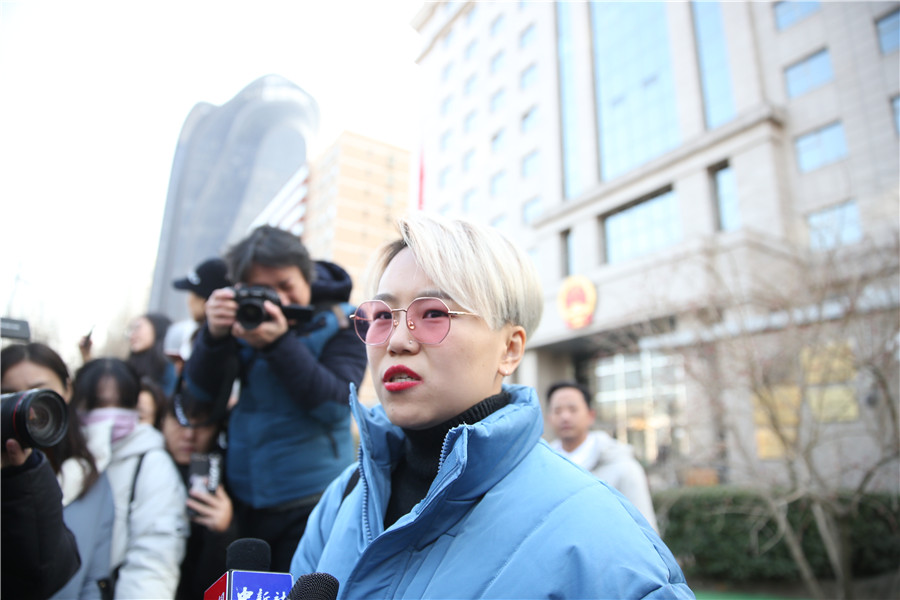Egg freezing technology raises late motherhood hopes for Chinese women
By WANG XIAOYU | China Daily Global | Updated: 2020-01-13 08:49

Guo Lei had a nightmare before her egg-retrieval day at a fertility clinic in Los Angeles, a city in the United States. She dreamed of having her body incised and torn open from both sides from neck down, leaving two scars that could jeopardize her livestreaming career in Beijing.
Egg retrieval is a process in which a woman's eggs are removed from her ovaries. These eggs are mixed with a man's sperm to facilitate fertilization.
But the real-life surgery passed like a breeze, thanks to anesthesia. As planned, a total of eight eggs were retrieved from her body in less than 15 minutes and transferred to a liquid nitrogen canister for storage for up to ten years.
"If I do not have a child in three years, I'll probably thaw and use these eggs. It's my Plan B," she said. At 32, Guo is already behind her original plan of becoming a mother before reaching 30. She blamed the delay to a hectic work schedule and difficulty in finding a suitable partner.
Rapid economic development in China has tapped into the potential of female workforce and diminished the urgency of childbearing for women committed to work or self-improvement.
According to the National Health Commission, the average age at which women give birth to the first child in China reached nearly 26 in 2015, and rose by one year from 2016 to 2019. In Shanghai, the childbearing age is as high as 29, the municipal women's federation said.
Biological clock ticking
But the biological clock for women is ticking irrespective of the societal change. While men can produce sperm throughout their lives, women's eggs diminish in quality and quantity as they age, and decrease rapidly after the late thirties.
With ovaries deteriorating fast after 35, it's not easy to get pregnant, and there are risks of miscarriage or birth defects, Qiao Jie, president of Peking University Third Hospital, said at a news conference.
An increasing number of women in the country are intrigued by the promise of extending fertility through egg freezing. But there is a ban on unmarried women freezing their eggs in China, prompting determined females to freeze and store their eggs overseas.
Data released in April by the Society for Assisted Reproductive Technology, a nonprofit group in the US, shows that 10,936 women have had their eggs frozen in the country in 2017, up from 8,825 in 2016, and 6,207 in 2015. A decade ago, the number was less than 500.
Booming business
Chinese customers are part of the booming business. Gu Siliang, co-founder of Joybaby, an agency in Shanghai that connects Chinese clients with the US fertility clinics, said last year, it had arranged for about 1,400 women to undergo the egg freezing procedure, up from about 1,000 in 2018 and 500 in 2017.
However, only a small portion are able to pay the hefty fee and complete the demanding process overseas like Guo.
Undergoing a cycle of egg freezing in popular destinations, such as the US, Japan or Thailand, will cost between 100,000 yuan ($14,455) and 200,000 yuan.
Xu Zaozao, the pseudonym for a 31-year-old Beijing resident, balks at the inhibitive price tag.
On Dec 23, she filed a lawsuit against a hospital in the city for rejecting her request to have her eggs harvested and frozen based on a regulation that governs the use of assisted reproductive technology and prohibits hospitals from providing egg freezing services to single women.
It is the country's first legal case over the rights of unmarried women to access egg freezing. The first hearing in the case was adjourned in late December. The date for a second hearing has not been decided yet.
Xu decided against going abroad for the procedure. "It's infeasible for a single woman in Beijing to fork out tens of thousands of yuan for egg freezing overseas. It's too expensive," she said. "I am also unsure if my eggs can stay healthy long enough for me to fatten my bank account."
Social norm
Wang Yue, a professor at Peking University's School of Health Humanities, told the Legal Daily newspaper that in addition to the regulation, the social norm that it is inappropriate to conceive a child out of a wedlock also hinders the availability of egg freezing to unmarried women in China.
However, such a traditional stance can be further challenged in the future as attitudes over marriage and fertility are changing, he added.
A customer with Gu's agency, who declined to be named, agreed that the quality of eggs deteriorates as a law of nature. She turned 30 last year.
"I won't marry out of age concerns, with or without having a few eggs frozen and stored," she said. "But the decision to freeze my eggs has allowed me to overcome biological limitations, making me feel more free, and more in charge of my life."























